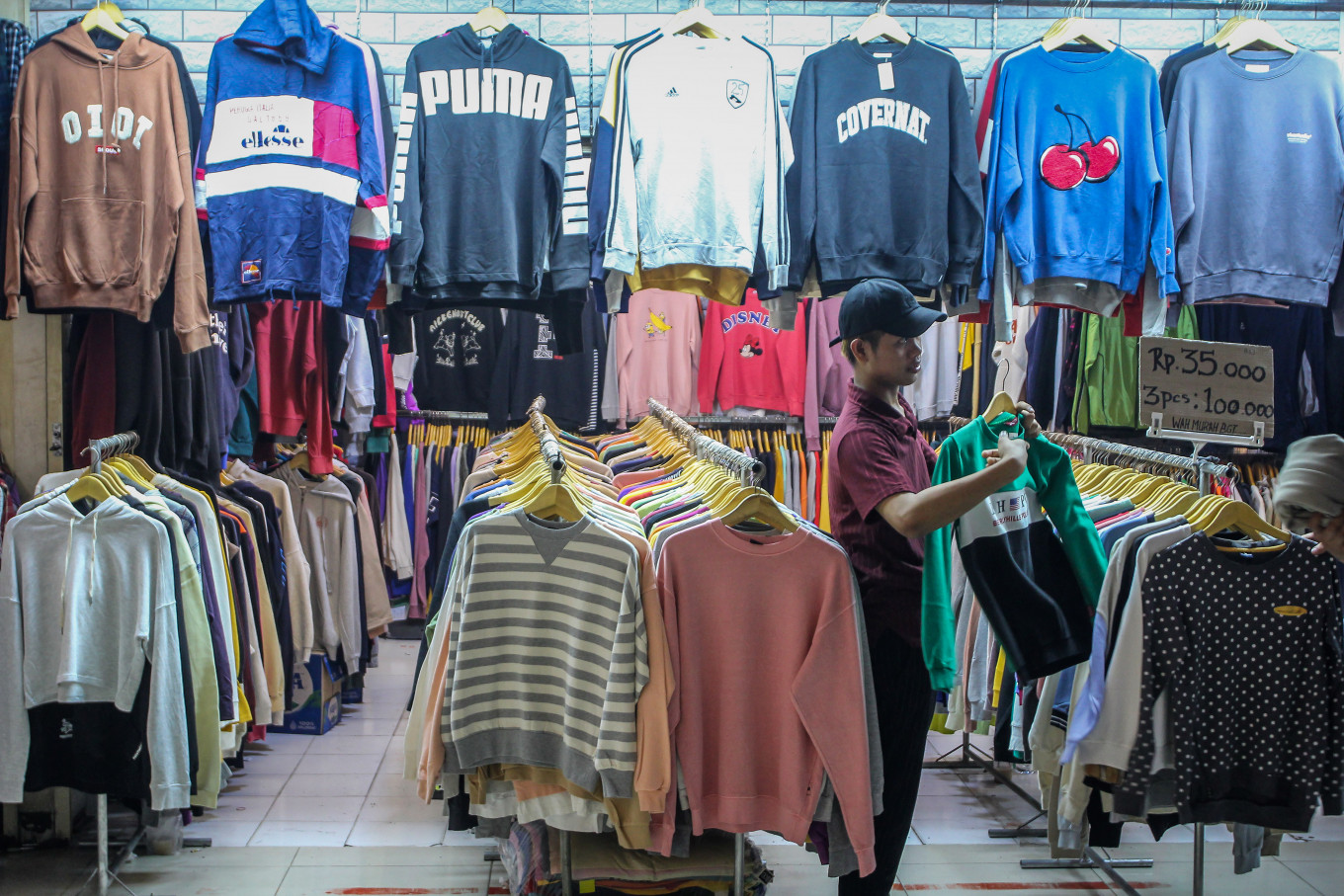Popular Reads
Top Results
Can't find what you're looking for?
View all search resultsPopular Reads
Top Results
Can't find what you're looking for?
View all search resultsCombating illegal imports of manufactured products
The consequences of illegal imports for domestic manufacturing are profound, ranging from the disruption of fair competition to workforce layoffs.
Change text size
Gift Premium Articles
to Anyone
I
llegal imports constitute a significant challenge and concern for the domestic manufacturing sector. In recent years, the government has intensified enforcement against the illegal importation of second-hand clothing in response to the increasing circulation of such goods in the domestic market. Regulatory measures now encompass both offline and online sales channels, including live commerce platforms.
The data show a discrepancy between the import figures recorded by Indonesia’s statistical authorities and the export figures reported by the exporting countries. For example, Statistics Indonesia (BPS) recorded garment imports (HS codes 61 to 63) from China at US$251.6 million in the first eight months of the year. Meanwhile, China’s authorities recorded garment exports to Indonesia at $608 million. This indicates that $356.4 million worth of garment imports were not captured by Indonesia’s authorities.
This could potentially indicate an act of under-invoicing, in which the perpetrator reduces the value of the goods in the import documents so that taxes and import duties appear lower, or an act of illegal smuggling, in which the goods are not declared at all.
The importation of second-hand clothing has long been prohibited, as stipulated in Law No. 17/2014 and reinforced by Trade Minister Regulation No. 40/2022 on prohibited export and import goods. Illegal imports are not confined to the garment sector, they extend to other high-value sectors with substantial market demand. Manufactured goods, including electronics, footwear, steel and vehicle spare parts, frequently enter the country without complying with official procedures.
The consequences of illegal imports for domestic manufacturing are profound. One of the primary impacts is the disruption of fair competition. Goods entering the country illegally, without payment of import duties, taxes or adherence to technical standards, are often sold at significantly lower prices than domestically produced alternatives. This undermines the competitiveness of local producers, despite their full compliance with taxation, production costs and quality standards.
The next impact is on the workforce, when manufacturing companies reduce production capacity due to declining demand, they typically respond by cutting working hours, suspending recruitment or implementing layoffs. This directly affects workers’ welfare and places additional pressure on the national labor market. Furthermore, illegal imports depress demand for domestic products and reduce government revenue from customs and taxation.
Several interrelated factors contribute to the persistent occurrence of illegal imports. First, inadequate monitoring at entry points, particularly small ports and unofficial routes, poses a major challenge. Indonesia’s extensive coastline, limited resources and technological constraints hinder effective surveillance. Smugglers often exploit administrative loopholes, falsify documents or misclassify goods to evade detection.
Second, the involvement of officials lacking integrity in supervision and licensing processes exacerbates the problem. Corruption, collusion and bribery create opportunities for illegal goods to enter the country, thereby undermining law enforcement. Regulatory complexity also plays a role; when import procedures are perceived as excessively stringent or cumbersome, some businesses resort to illicit channels as a cost-effective alternative.
To address these challenges, the government has implemented strategic measures. The establishment of the Illegal Import Task Force, comprising multiple ministries and agencies, facilitates joint operations and enforcement against smugglers. Additionally, this year the government has revised the Trade Minister regulations to streamline import procedures, tighten technical requirements and clarify prohibited and restricted goods categories. These regulatory adjustments target commodities particularly vulnerable to smuggling, including textiles, electronics, food products, pharmaceuticals and other consumer goods.
Further measures are necessary to strengthen law enforcement. Law enforcement must be consistent and uncompromising, extending beyond seizure of goods to include tracing financial flows, dismantling logistics networks and freezing perpetrators’ assets. Substantial economic sanctions, including fines and permanent revocation of import licenses, are essential to achieve a meaningful deterrent effect. Equally important is the strict enforcement of regulations against officials involved in illegal activities, whose actions erode public trust and weaken oversight mechanisms.
Enhanced inter-agency coordination is critical. Customs, law enforcement, the military, the Drug and Food Monitoring Agency (BPOM), quarantine authorities and the Trade Ministry must collaborate in intelligence sharing, joint operations and monitoring of distribution channels. This coordination ensures that loopholes exploited by smugglers, including small ports, clandestine routes and document manipulation, are effectively closed. The capacity and operational effectiveness of the Illegal Import Task Force must be continuously strengthened to maximize preventive measures.
Public awareness campaigns are also vital. Educating consumers on the economic, industrial and social risks of illegal imports can reduce demand for unlawful goods and foster greater compliance with legal trade channels.
In conclusion, a combination of strict law enforcement, effective inter-agency coordination, regulatory clarity and public education is essential to combat illegal imports. Such measures not only safeguard domestic industry and maintain market stability but also enhance state revenue. Addressing illegal imports should be viewed not merely as a punitive endeavor but as a strategic component of establishing a sustainable, transparent and accountable trade system that protects consumers, strengthens domestic manufacturing and reinforces public confidence in trade governance.
*****
The writer is an industry and regional analyst at Bank Mandiri











